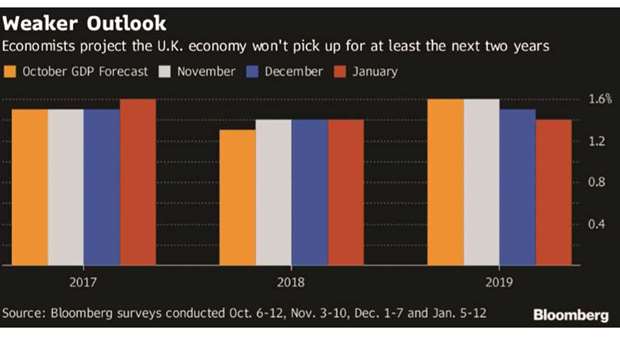Respondents to Bloomberg’s first UK survey of 2018 showed few signs of new year optimism. The median forecast for growth this year was kept at 1.4%, and no acceleration is seen in 2019. While gross domestic product probably gained 1.6% in 2017, more than previously estimated, that’s still the slowest in five years.
The economy started cooling last year as accelerating inflation fuelled by the pound’s post-Brexit vote slump squeezed consumers. But that didn’t stop the Bank of England raising interest rates for the first time in a decade on concern about domestic price pressures. According to the survey, another hike is likely this year, with Scotiabank saying it could come as early as May.
Data on Tuesday showed price growth may have peaked, as inflation slipped to 3% in December from a 5 1/2-year high of 3.1% a month earlier. Yet that’s still above the BoE’s 2% target and faster than average income gains, leaving retail sales struggling to gain traction.
Household consumption is projected to weaken to 1.2% this year, and pick up only slightly to 1.3% in 2019, the survey showed. It averaged 2.3% in the five years through 2016.
If wages pick up and consumption strengthens, the BoE may raise its key rate from 0.5% sooner than the fourth quarter, a minority of economists said. By contrast, a few see policy makers waiting another two years before raising borrowing costs from emergency lows again.
The median forecast shows the next increase in interest rates coming in the final three months of the year, but 10 of the 41 economists say it could be as soon as the second quarter, putting the BoE’s May meeting into the spotlight, as that’s when it will update its own projections.
“I’m more aggressive than the market and a number of forecasters in thinking we could see a hike in May,” said Scotiabank economist Alan Clarke in a Bloomberg Radio interview. “If that trajectory for growth continues to improve as inflation goes down and wages go up, we could get another one in November.”

